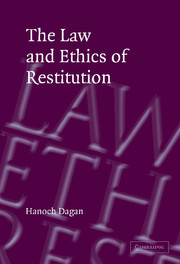Book contents
- Frontmatter
- Contents
- Acknowledgments
- Table of cases
- Table of statutes and treaties
- 1 Introduction
- 2 Preventing unjust enrichment
- 3 Mistakes
- 4 Other-regarding conferrals of benefits
- 5 Self-interested conferrals of benefits
- 6 Restitution in contexts of informal intimacy
- 7 Wrongful enrichments
- 8 Restitution in a contractual context
- 9 Restitution in bankruptcy
- 10 Reasons for restitution
- Bibliography
- Index
6 - Restitution in contexts of informal intimacy
Published online by Cambridge University Press: 05 July 2009
- Frontmatter
- Contents
- Acknowledgments
- Table of cases
- Table of statutes and treaties
- 1 Introduction
- 2 Preventing unjust enrichment
- 3 Mistakes
- 4 Other-regarding conferrals of benefits
- 5 Self-interested conferrals of benefits
- 6 Restitution in contexts of informal intimacy
- 7 Wrongful enrichments
- 8 Restitution in a contractual context
- 9 Restitution in bankruptcy
- 10 Reasons for restitution
- Bibliography
- Index
Summary
The preceding chapters, as well as the ones to follow, correspond by and large to the accepted categories of the law of restitution. This chapter is different. It covers an amalgam of restitutionary rules, claiming that together they have a coherent and normatively appealing theme that goes unobserved by the existing literature.
The structure of the chapter follows this goal. Sections A–C discuss the three doctrines I seek to integrate: unjust enrichment between cohabitants, restitution for the supply of necessaries, and rescission of gifts due to undue influence. These three doctrines do not easily fit into the familiar categories of restitution. The conferrals of benefits addressed by these seemingly unrelated doctrines can be properly characterized neither as sheer pursuit of self-interest (like the cases discussed in chapter 5) nor as acts of good-samaritanism (like the cases analyzed in chapter 4). As we will see throughout sections A–C, they are better characterized as different aspects of the legal facilitation of relationships of long-term reciprocity.
More precisely, this chapter shows how the law of restitution supports the liberal vision of community. By community I refer to “any group of people who share a range of values, a way of life, identify with the group and its practices and recognize each other as members of that group.” In identifying themselves with a community, individuals commit themselves to it: they endorse and promote its projects and regard their own well-being as intimately linked to its flourishing.
- Type
- Chapter
- Information
- The Law and Ethics of Restitution , pp. 164 - 209Publisher: Cambridge University PressPrint publication year: 2004



